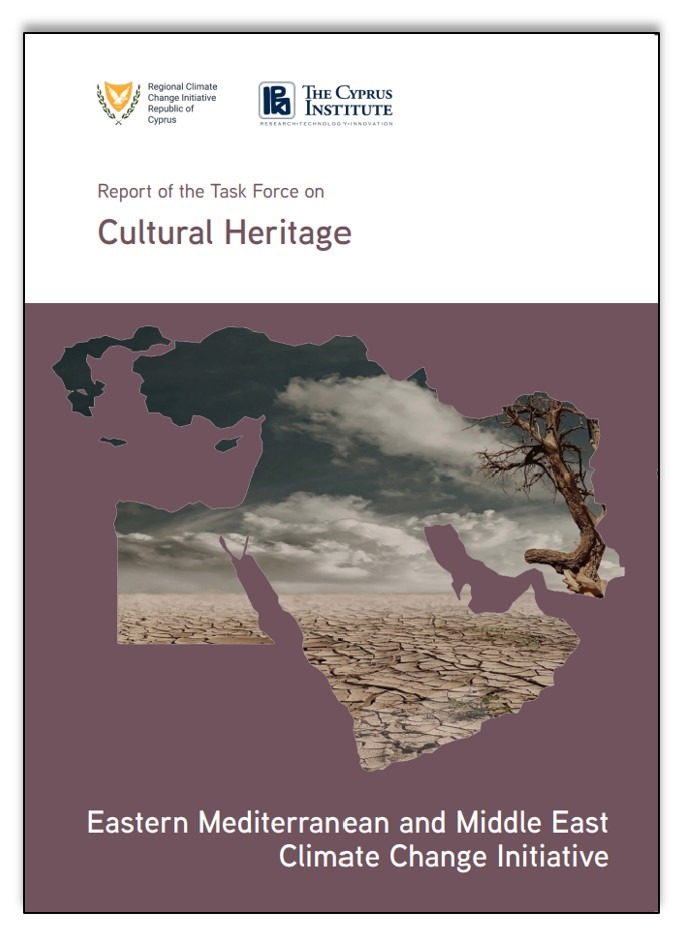
Cultural Heritage
The EMME region is considered one of the epicentres of World Cultural Heritage being the home to the earliest historic civilizations and three monotheistic religions, Judaism, Christianity and Islam, which significantly shaped the world as we know it. Currently, the region is comprised by country states of various sizes and populations, in different economic stages of development, and with particular political, social and cultural conditions and characteristics. Yet, they all share a common challenge as they face the impact of Climate Change which is expected to threaten their well-being and growth over the next decades. The region’s rich Cultural Heritage is already affected and is expected to suffer from the effects of Climate Change.
This report intends to provide a review of the current state of preservation and preparation for Climate Change impact on Cultural Heritage in the EMME region. Furthermore, it identifies the series of specific threats against monuments, sites, traditions and rituals throughout the region caused by both natural and the related anthropogenic causes. Rising temperatures, rising sea level and coastal erosion, rainfall and extreme weather (droughts, fires, floods etc), soil erosion, desertification and dwindling water resources, environmental/ atmospheric pollution, as well as, destructive development, looting, neglect, migration and war threaten both tangible and intangible heritage and the cultural landscapes constituting the backbone of local communities and societies across the region since antiquity.
In addition, this report offers an overview of existing policies and strategies and identifies the relevant gaps across the stakeholder-countries to mitigate and adapt to the inevitable impacts of Climate Change. Science and technology advances and tools for documenting, monitoring, predicting, assessing and policy making are highlighted in the report. Moreover, it offers a toolkit of new policies, strategies and best practices to prepare for and ameliorate the impact of Climate Change as the region strives for a more resilient Cultural Heritage based on collaboration and coordinated action.
Finally, the report examines the catalytic role of Cultural Heritage as a change-agent towards adaptation and mitigation plans. The Humanities and the Social Sciences can be critical catalysts in framing the broader challenge in the EMME region as we try to learn from the past and to re-define the meaning, value and role of Cultural Heritage in a changing world.
(Click here to download the report in .pdf format)
Abstract from the Report of the Task Force on Cultural Heritage
Climate change has emerged as one of the most serious threats to world heritage. The Eastern Mediterranean and Middle East (EMME) will be seriously affected by climate change, with preliminary evidence showing negative effects on sites and monuments.
This development is projected to worsen as most EMME countries are presently moving in a direction opposite from that recommended by the Intergovernmental Panel on Climate
Change-related to limiting the rise in global temperatures.
Despite the enormous economic importance of cultural heritage to many EMME states (through tourism), cultural heritage remains a low priority in governmental responses to climate change, if it is addressed at all. As a consequence, there are serious gaps in knowledge about the impacts of climate change on cultural heritage in the region. Beyond the framework of UNESCO, the International Council on Monuments and Sites, the European
Union, and other international organisations and institutions that have identified the threat, local policies in the EMME region remain limited, fragmented and lacking in regional focus. No systematic coordinated monitoring has been done to provide baseline data across the region and make it possible to assemble a platform for future research and actions. Because regional coordination is an essential precondition to tackle this major challenge, this task force and its report aim at identifying threats, highlighting knowledge and research gaps, and mapping the current situation. The effort sets the basis for a policy toolkit that contributes recommendations towards a framework for regional collaboration to foster the exchange of know-how, expertise and good practices, and to support capacity-building activities among regional stakeholder states. The toolkit offers a range of policy recommendations and directives to address a broad array of problems and challenges. It is flexible to allow stakeholder states to use it in ways that suit their particular needs while also respecting science and maintaining vital channels of regional communication and coordination. The report’s vision is to first capture where the region stands regarding the impact of climate change on cultural heritage, and second, to articulate a much-needed policy framework to build regional capacity and a more resilient cultural heritage.

Task Force
Task Force Coordination
Prof. Nikolas Bakirtzis, The Cyprus Institute
Cyprus Institute Liaison Scientist
Dr. Dante Abate
Task Force Members
Prof. Nizar Abu-Jaber, German Jordanian University
Prof. Seif Assaad, Lebanese University
Prof. Costas Cartalis, National and Kapodistrian University of Athens
Dr. Véronique Chankowski, French Archaeological School in Athens
Prof. Stella Demesticha, University of Cyprus
Prof. Mona Haggag, University of Alexandria
Prof. Sturt Manning, Cornell University
Mrs. Sneška Quaedvlic-Mihailović & Mr. Paolo Vitti, Europa Nostra
Dr. Houmam Saad, Syria Directorate General of Antiquities and Museums
Dr. Marina Solomidou-Ieronymidou, Cyprus Department of Antiquities
Dr. Jelena Trkulja, Qatar Museums Authority

